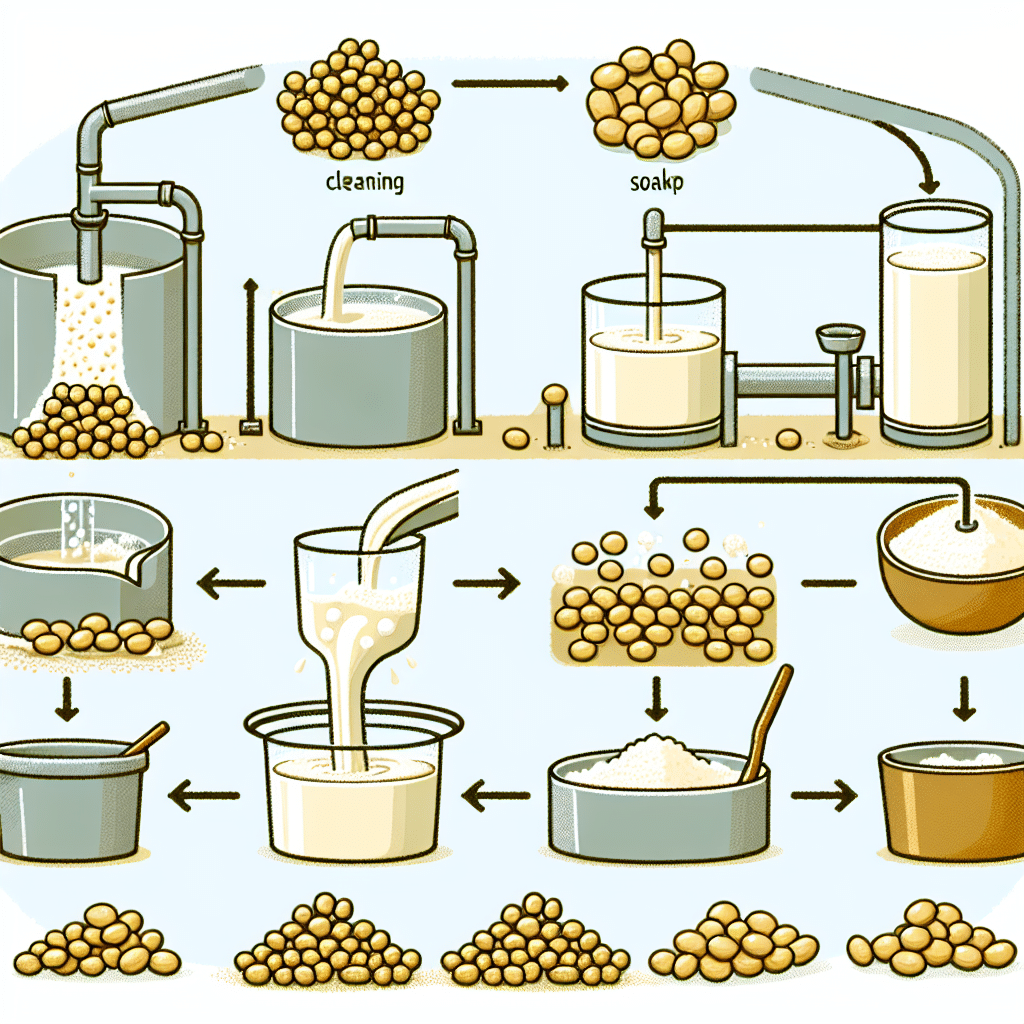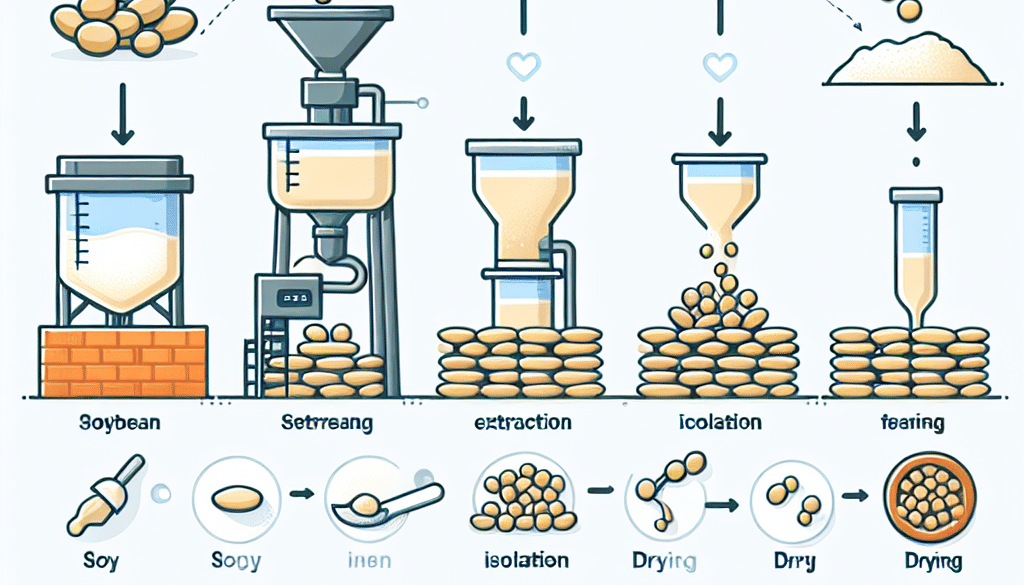What Is Soy Protein Made Of? Deep dive
Table of Contents
- Soy Protein: Understanding Its Composition and Benefits
- What Constitutes Soy Protein?
- The Manufacturing Process of Soy Protein
- Types of Soy Protein Products
- Nutritional Profile and Health Benefits of Soy Protein
- Health Benefits Backed by Research
- Case Studies and Statistics: Soy Protein in Action
- Choosing the Right Soy Protein Product
- Conclusion: The Versatile and Nutritious Choice
- Discover ETprotein’s Premium Soy Protein Products
Soy Protein: Understanding Its Composition and Benefits

Soy protein has become a staple in the diets of many health-conscious individuals, vegetarians, and those with dietary restrictions that limit the intake of animal proteins. As a plant-based protein source, soy protein offers a range of health benefits and is a versatile ingredient in various food products. This article delves into the composition of soy protein, its manufacturing process, and its nutritional advantages, providing a comprehensive understanding of this popular protein alternative.
What Constitutes Soy Protein?
Soy protein is derived from soybeans, which are legumes native to East Asia but now cultivated globally. Soybeans are an excellent source of protein and contain all nine essential amino acids, making them a complete protein source. The process of making soy protein involves several steps, which we will explore in detail.
The Manufacturing Process of Soy Protein
- Dehulling and Defatting: The initial step in creating soy protein is to remove the outer hulls of the soybeans and extract the oil. This is typically done through a combination of heat and pressure, resulting in defatted soybean flakes.
- Protein Isolation: The defatted flakes are then processed to separate the protein from the carbohydrates and fiber. This is achieved by washing the flakes with either water or alcohol, which dissolves the non-protein components, leaving behind the protein-rich portion.
- Drying: The isolated protein is then dried and turned into a powder. This soy protein isolate is the purest form of soy protein available, containing around 90-95% protein.
Types of Soy Protein Products
- Soy Protein Isolate: As mentioned earlier, this is the most refined form of soy protein, used in various dietary supplements and health foods.
- Soy Protein Concentrate: This form contains a lower percentage of protein (about 70%) and retains more of the other components of the soybean, such as dietary fiber.
- Textured Soy Protein (TSP): Also known as textured vegetable protein (TVP), TSP is made from soy protein concentrate by giving it a texture that resembles meat. It’s commonly used as a meat substitute in vegetarian and vegan dishes.
Nutritional Profile and Health Benefits of Soy Protein
Soy protein is not only a complete protein source but also rich in vitamins and minerals. It contains B vitamins, phosphorus, potassium, and magnesium, among others. Additionally, soy protein is low in saturated fats and is cholesterol-free, making it a heart-healthy option.
Health Benefits Backed by Research
- Cardiovascular Health: Studies have shown that soy protein can help reduce bad cholesterol levels (LDL) and potentially lower the risk of heart disease.
- Weight Management: Soy protein can promote satiety, which may help in weight management by reducing the overall calorie intake.
- Muscle Building and Recovery: As a complete protein, soy protein supports muscle building and recovery, making it a popular choice among athletes and fitness enthusiasts.
- Bone Health: Some research suggests that soy protein, along with its isoflavones, may have a positive effect on bone density.
Case Studies and Statistics: Soy Protein in Action
Several case studies have highlighted the effectiveness of soy protein in improving health outcomes. For instance, a study published in the “Journal of the American College of Nutrition” found that soy protein supplementation led to significant reductions in cholesterol levels among participants with high cholesterol.
Statistics also underscore the growing popularity of soy protein. According to market research, the global soy protein market size was valued at USD 8.91 billion in 2020 and is expected to expand at a compound annual growth rate (CAGR) of 7.4% from 2021 to 2028.
Choosing the Right Soy Protein Product
When selecting a soy protein product, it’s essential to consider factors such as the type of soy protein, the presence of additives or sweeteners, and whether it’s organic or non-GMO. Reading labels carefully and choosing reputable brands can ensure that you’re getting a high-quality product that aligns with your dietary preferences and needs.
Conclusion: The Versatile and Nutritious Choice
In conclusion, soy protein is a versatile and nutritious plant-based protein that offers a wealth of health benefits. Its complete amino acid profile, low-fat content, and cholesterol-free nature make it an excellent choice for those looking to improve their diet and overall health. Whether you’re an athlete, a vegetarian, or simply someone looking to incorporate more plant-based proteins into your diet, soy protein is a valuable addition to your nutritional arsenal.
Discover ETprotein’s Premium Soy Protein Products
If you’re interested in incorporating high-quality soy protein into your diet, ETprotein offers a range of organic bulk vegan proteins that cater to various needs. Their soy protein products are characterized by a neutral taste, non-GMO, and allergen-free attributes, ensuring that you receive the best in terms of both nutrition and flavor.
About ETprotein:
ETprotein, a reputable protein and L-(+)-Ergothioneine (EGT) Chinese factory manufacturer and supplier, is renowned for producing, stocking, exporting, and delivering the highest quality organic bulk vegan proteins and L-(+)-Ergothioneine. They include Organic rice protein, clear rice protein, pea protein, clear pea protein, watermelon seed protein, pumpkin seed protein, sunflower seed protein, mung bean protein, peanut protein, and L-(+)-Ergothioneine EGT Pharmaceutical grade, L-(+)-Ergothioneine EGT food grade, L-(+)-Ergothioneine EGT cosmetic grade, L-(+)-Ergothioneine EGT reference grade and L-(+)-Ergothioneine EGT standard. Their offerings, characterized by a neutral taste, non-GMO, allergen-free attributes, with L-(+)-Ergothioneine purity over 98%, 99%, cater to a diverse range of industries. They serve nutraceutical, pharmaceutical, cosmeceutical, veterinary, as well as food and beverage finished product distributors, traders, and manufacturers across Europe, USA, Canada, Australia, Thailand, Japan, Korea, Brazil, and Chile, among others.
ETprotein specialization includes exporting and delivering tailor-made protein powder and finished nutritional supplements. Their extensive product range covers sectors like Food and Beverage, Sports Nutrition, Weight Management, Dietary Supplements, Health and Wellness Products, and Infant Formula, ensuring comprehensive solutions to meet all your protein needs.
As a trusted company by leading global food and beverage brands and Fortune 500 companies, ETprotein reinforces China’s reputation in the global arena. For more information or to sample their products, please contact them and email sales(at)ETprotein.com today.












